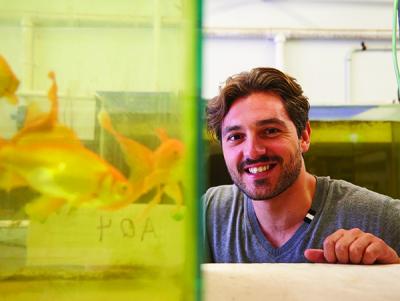
This qualification is your first step towards an exciting career in the aquaculture industry! You'll build a great range of skills and knowledge that will get you job ready to work as a field hand in a range of aquaculture operations.
This could include working in a hatchery, nurseries, or a sea cage or pond facility — even pet shops, public aquaria, zoos or other facilities with aquatic animals — in a range of environments including on and offshore culture facilities. You'll learn about handling and harvesting stock; preparing stock for live transport; controlling pests, predators and diseases; monitoring stock and environmental conditions; maintaining and manipulating the water environment and applying chemicals and biological agents producing algal cultures; and working effectively in the seafood industry.
This course is also available for secondary school students (Years 11 and 12).
Choose a WA TAFE college that delivers this course
To find out more about doing this course at a WA TAFE college, select one of the TAFEs listed below to read their course descriptions. You'll also be able to see at which TAFE campus/es the course is delivered.
If you would like further information such as when the course is available and how to enrol, and details of course fees, or if you have questions about how the course is delivered, please follow the Find out more link to go to the TAFE's website where you will find full course details and contact information so that you can speak to the TAFE directly.
Great careers don’t all grow on trees.
A Certificate II in Aquaculture will provide you with the practical skills and knowledge to assist in the care and maintenance of fish stocks. You will learn skills in food handling, controlling pests, predators and diseases, handling and harvesting stock, maintaining and manipulating the water environment and applying chemicals and biological agents. It provides individuals with skills and knowledge to work as a field hand in an aquaculture operation such as a hatchery, sea cage or pond facility. It is applicable to school-based studies.
You will also gain knowledge and skills in:
- Controlling diseases
- Collecting broodstock
- Handling food
- Handling and harvesting stock
- Maintaining water environments and
- Applying chemicals and biological agents.
As an aquaculture attendant, you may undertake a range of routine tasks such as:
- Handling animals
- Feeding animals
- Monitoring animals
- Monitoring environmental conditions
- General housekeeping, hygiene and biosecurity practices
The skills that you will learn will be relevant to other work environments where you may find work, including:
- Offshore and Onshore aquaculture farms
- Aquarium wholesalers and retailers
- Hatcheries and nurseries
- Live post-harvest holding facilities
All work is carried out to comply with workplace procedures, according to state/territory health and safety, food safety, biosecurity and environmental regulations, legislation and standards that apply to the workplace.
This course is only available to learners planning to engage in a Traineeship, OR currently working in the aquaculture industry.
This qualification is the crucial first step towards an exciting career in aquaculture. This course provides students with a range of core skills and knowledge relevant to working in the aquaculture industry. Graduates go on to further studies or working in a range on environments including onshore aquaculture facilities, offshore culture facilities and the ornamental fish industry.
Aquaculture is a fast-growing industry. The United Nations Food and Agriculture Organization (FAO) issued a report in 2018 stating that ‘aquaculture is fastest growing food production sector worldwide’. Typical entry-level jobs for those holding Certificate II include:
- Australian and overseas aquaculture farms
- hatcheries and nurseries
- live post-harvest holding facilities, such as processing plants, wholesalers or
- transporters, pet shops, public aquaria, zoos or other facilities with aquatic animals
Study in a specialised facility in the maritime heart of Fremantle
Fremantle campus features extensive salt and freshwater aquaculture facilities, and experienced staff which offers plenty of relevant hands-on opportunities. Our staff have involved students in the culture and applied research projects of many marine and freshwater organisms over the last two decades including species such as abalone, dhufish, yellowtail kingfish, marron and barramundi.
The information presented on the course lists within this website is provided to the Department of Training and Workforce Development by the WA TAFE colleges and private training providers, and is offered as a guide only. It is updated regularly, however some changes to details may occur in between updates. You should always contact the TAFE or private training provider directly to confirm details and/or ask questions.


